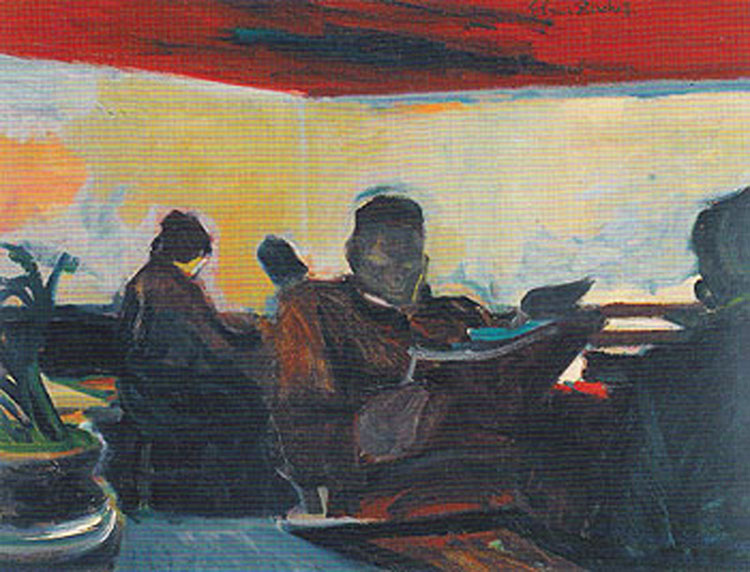by Giuseppa Brena (July 2024)
Translated from the Italian by James Tetreault

Luisa didn’t particularly care for that deserted corner of the station nor were the looks of the few people there very reassuring. But then she didn’t want to go to a restaurant for the usual skimpy, crumbly panino. So she sat down at a bench and took from her bag the substantial ham sandwich she’d made at home and began to eat. A bad smell wafted her way, and only then did she become aware of the person sitting in a corner across from her, a little old man with the appearance of somebody who had not attended to his clothing for a good long while. His rumpled pants were too large for him, his unlaced shoes barely covered his feet, and his jacket was at least two sizes too big. Gray, rumpled hair and a toothless mouth completed the picture. His hand held a piece of bread, wrapped in paper, from which he took tiny bites, slowly, one by one.
When a piece fell to the dirty floor, he retrieved it and put it in his mouth. Luisa thought to herself, “Here are two solitary old people—she too felt alone—and they are eating together. One is called a lady, with her generous sandwich, and the other a poor wretch with his pathetic crumbs.”
There came over her a feeling of tenderness, and also the thought that just maybe at that moment the Lord was looking upon this poor castoff creature of His with greater love than He felt looking upon her.
When he finished his meal, he addressed her.
“You know, this time my sandwich was really good. I found some delicious cheese that went down very well, a real pleasure. But I don’t always eat that well, you know. Sometimes I get something to eat in Venice, where they make a pasta with mussels that’s really great, or else I go to Treviso to eat risotto col radicchio trevisano, the genuine article … or I go to Vicenza, and I eat a codfish specialty that’s a real marvel. Do you know how to cook codfish?
“Yes, sometimes I cook it.”
“I’ll bet it’s not as good.”
Luisa took the risk: “But where is it you live?”
“You’d like to know, wouldn’t you? Well, I’m not going to tell you.”
From the looks of the shabby bag he kept near him, there was no doubt he was a homeless man, and those dinners he was talking about might have been from his past life. They were certainly not from the present, just as there was really no cheese with his bread. In his state no restaurant would have let him set foot inside. To be sure, he told everything with a certain satisfaction and seemed happy in his life.
“You know,” he added, “I was even married—twice—but to tell the truth, I messed up. Maybe I wasn’t cut out for married life. Now I’m a free man and I get along with everyone. I always run into lots of nice people.”
Who knows if the “nice people” were real or a fabrication? Lots of people certainly must have judged him to be a fool. Luisa, however, liked listening to him. At this very moment when she had on her mind so many family problems, so many questions about her health, here she was through the agency of this little old man feeling that life was good. All that’s needed is a bit of imagination. All you need to do is try to see that people are not bad.
She would have stayed longer to listen to him, but there was something she had to do.
“Excuse me, I’ve got to go, because I have a doctor’s appointment, a treatment I need every so often.”
“I’m sorry,” said the old man, “You have my good wishes.”
“Thanks. When I hear you say that, it makes me feel good.”
“What’s that? Don’t tell me you believe in certain things.”
“What things?”
“Fortune telling, the evil eye, magic spells, horoscopes…”
“No, I don’t believe in those things, but I do believe in good wishes from the heart.”
“Then you can rest easy, because I mean them from the heart.”
Luisa left. She had her usual treatment, which ordinarily left her with a long period of side effects.
This time, however, there were no side effects. In fact, she felt rather well, and for the first time in a long while she felt the treatment was doing her some good. Was it the old man’s good wishes? Perhaps it was only a lucky coincidence.
Nevertheless, Luisa believed in those good wishes and her heart was touched as she reflected that God’s love might be manifest in these benefits. Why not?
Table of Contents
Giuseppa Brena lives with her husband on the shore of Lake Garda in northern Italy; her two children and three grandchildren live in nearby cities. This story is from a collection of thirty-five published in Italy, entitled Nonni e Nipoti (Grandparents and Grandchildren).
Follow NER on Twitter @NERIconoclast
- Like
- Digg
- Del
- Tumblr
- VKontakte
- Buffer
- Love This
- Odnoklassniki
- Meneame
- Blogger
- Amazon
- Yahoo Mail
- Gmail
- AOL
- Newsvine
- HackerNews
- Evernote
- MySpace
- Mail.ru
- Viadeo
- Line
- Comments
- Yummly
- SMS
- Viber
- Telegram
- Subscribe
- Skype
- Facebook Messenger
- Kakao
- LiveJournal
- Yammer
- Edgar
- Fintel
- Mix
- Instapaper
- Copy Link










One Response
This is a sweet tale, rife with rich language. I enjoyed it.